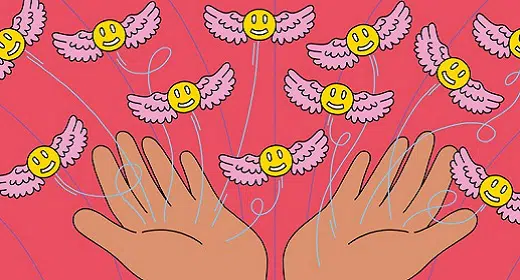by Arthur C. Brooks: You can find deep, lasting happiness in a good deed that no one knows you did…
The end of the year isn’t just the holiday season; it’s also charity season. Estimates of charitable giving indicate that at least 20 percent of all gifts are made in December, when our holiday love for humankind conveniently converges with the end of the tax year.
Giving is never a one-way transaction. Donating publicly to a prominent charity might bolster your reputation. Sending a gift to a friend or family member who’s struggling strengthens your relationship, and increases the chances that you’ll get help the next time you need it. At the very least, you might get a thank-you, which feels good.
But if you really want to reap the benefits of giving to others, you need to forgo all these perks. Sure, the thanks, admiration, or praise might give you a quick hit of pleasure. But you’ll get deeper, lasting happiness from a good deed that no one knows you did.
As hard as giving is at times, the fact that it raises our well-being is hardly a new finding. Voluntary giving is one of the fastest and most reliable ways to improve your mood; making it part of your lifestyle can have long-term effects on your life satisfaction. Giving charitably has been shown to stimulate brain activity associated with pleasure and reward. The correlation goes the other way too: In one experiment, artificially raising gift-givers’ blood-oxytocin levels made them 48 percent more generous.
To some thinkers, though, the happiness you derive from giving is meaningless compared with the virtue you create. Maimonides, a Sephardic sage born in Córdoba, Spain, in the 12th century, taught that charity existed on eight levels, arranged by order of virtue. The top level was creating opportunity for others through investment or a job offer. Just below this, however, was “double-blind” charity: giving when you do not know the recipient, and the recipient does not know you. That gift is almost as virtuous if you know who’ll receive it, but not vice versa. Any situation in which the recipient knows the donor’s identity fell lower on the list.
In other words, for Maimonides, private giving was superior to public giving. And because philosophers of his age, influenced by Aristotle and Plato, saw happiness as defined by virtue, you might say Maimonides’s ladder of giving was an assertion that private giving brought more authentic happiness than its public counterpart.
One modern study on the matter shows that Maimonides was right, at least sometimes. Writing in the International Journal of Research in Marketing in 2015, two scholars undertook experiments to see whether publicized or unpublicized donations to charitable causes brought more happiness to the donor. They found that among people with “high moral identity”—people who strongly base their self-definition on their moral values—unpublicized gifts brought roughly 16 percent greater happiness than publicized gifts. For those on the other end of the moral-identity spectrum, there was no significant happiness difference.
The researchers hypothesized that one reason for the difference may be that publicized gifts, in enhancing the donor’s reputation in the eyes of others, can make a self-reflective donor doubt her own motivations, extinguishing the warm glow. This is a secular version of the biblical injunction “Be careful not to practice your righteousness in front of others to be seen by them. If you do, you will have no reward from your Father in heaven.”
The implications of all of this are pretty obvious: The many causes asking for your support right now are offering you a quick and easy way to buy some happiness. Take it. But do so privately, or even anonymously. And follow these two tips to make sure your giving really will make you happier:
1. Give more than money.
Cold, hard cash is almost certainly not the only resource you value and can share. Giving away your expertise, energy, and affection can provide large happiness benefits too; for example, researchers have found that volunteering directly improves happiness across cultures and countries. Of course, volunteering anonymously is harder than secretly giving away money. At the very least, however, you can refrain from bragging about it on social media.
Volunteering might even make you more likely to give money, and get happier by doing so. My colleague David Van Slyke and I found in 2005 that, on average, a volunteer can be expected to give $4,000 more in monetary donations each year than a non-volunteer. If you can afford it, volunteer and donate, and don’t take credit for the latter.
2. Use your giving to express yourself.
“Where your treasure is, there your heart will be also,” the scripture teaches. Self-expression is a driver of happiness; the more our work allows us to self-express, for example, the happier we tend to be. Furthermore, researchers have shown that granting people an opportunity for even a little bit of self-expression by offering them a choice (for example, by asking whether they prefer cats or dogs) increases generosity.
If you want to boost both your giving and the happiness it brings, you should look for causes that truly express your values and sentiments, and pass on those that don’t. With roughly 1.54 million nonprofit organizations and at least 331,000 houses of worship, the U.S. alone has plenty to choose from. No studies have looked specifically at self-expression through anonymous giving, but there is no reason to believe that it would not be beneficial too, especially if it reinforces your own values to yourself. Moral self-identity is crucial for well-being.

















































